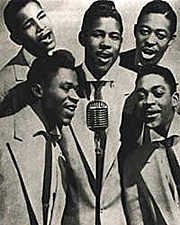
![]() Chapter
1: Why Doo-Wop
Introduction
Chapter
1: Why Doo-Wop
Introduction
Don McClean, in his 70s anthem "American Pie" (the song, not the movie), lamented the "day the music died," referring to legendary artist Buddy Holly's untimely death in February, 1959. Although some rock historians would debate whether Holly was a Doo-Wop artist--most consider him more rockabilly--there was a change in rock and roll music as the 60s rolled in. The so-called British invasion shoved many American rhythm-and-blues artists off the charts, and rock and roll as we knew it was changed forever. But one great phase lives on today--Doo-Wop. Editors Note for the Doo-Wop novice, courtesy of the Encyclopedia Britannica: "The term doo-wop is derived from the sounds made by the group as they provided harmonic background for the lead singer." Perhaps the music survives the strongest in old-timers like myself who grew up in the raucous (musically, anyway) 50s, and maybe there are only a few radio stations and even fewer disc jockeys who still play that distinctive sound today, but Doo-Wop does live on 40-50 years later. Witness Public Broadcasting's biggest fund-raiser in history--a Doo-Wop special in 1999. As U.S. News and World Report lamented in December, 1999, "It was born in the bathroom, the Beatles helped kill it in the '60s, and now PBS is counting on it to make a mint in viewer pledges. That's the story of doo-wop music, whose beautiful harmonies and heartfelt love songs gave some soul to rock-and-roll."
![]() Chapter
2: Be-bop-a-lula
The History
Chapter
2: Be-bop-a-lula
The History
Surprisingly, the Encyclopedia Britannica has a nice concise history of Doo-Wop, although purists would quibble with its inclusion of the Mills Brothers as a Doo-Wop group. Rhino Records will give you a brief Doo-Wop background, but also a promo for buying its box set (which is actually one of the best collections around). Rhino also gives more detail on the PBS special mentioned above. Oldies Music relates slightly different information and has great links to other music sites. For hard-core web surfers, try the Doo-Wop Web Ring for more information than you'll ever need.
![]() Chapter
3: Ba-Lap-Bang-Bing
The Groups
Chapter
3: Ba-Lap-Bang-Bing
The Groups
From birds to cars to flowers to animals to nonsensical names, the old Doo-Wop groups covered the gamut: The Orioles, the Cadillacs, the Gladiolas, the Spaniels the Champs, the Heartbeats, the Flamingos, the Moonglows, the Charts, the Crows, the Drifters, the Five Keys, the Nutmegs, the Five Satins, the Turbans...the list goes on and on. Once again, the Encyclopedia Britannica comes through with brief--but neat--information on the more well-known groups who gave Doo-Wop its popularity. Purdue University's site has great pictures of some of the original groups, but its text is inconsistent. Oldies Music consists of links to certain famous groups (the Coasters, the Five Satins, the Classics, the Marcels).
![]() Chapter
4: Ring Ring Goes The Bell
The Artists
Chapter
4: Ring Ring Goes The Bell
The Artists
Unfortunately, there does not seem to be much information on the individual artists who made such musical history. Little Anthony, Harvey Fuqua, Jimmy Beaumont, Tony Allen, Noland Strong, Fred Parris and other landmark contributors can be found in group listings mentioned in Chapter 3. The bigger names such as Chuck Berry, James Brown, Fats Domino, and others have their own personal home pages. There are too many to mention here, and undoubtedly your personal favorite would be missed! Search on AltaVista or Google for individual listings.
![]() Chapter
5 Who Will Buy These Memories
The Collectors
Chapter
5 Who Will Buy These Memories
The Collectors
You can't walk into School Kids Records and find original recordings by the original artists in 45 RPM format, especially since some of these dusty discs are nearly 50 years old. But as with many types of collectibles, the Doo-Wop sound is in plentiful supply, if sometimes somewhat expensive. The record collectors' bible is Goldmine, a monthly publication that contains hundreds of pages of auctions, sales, and individual collections, many of them related to Doo-Wop. Discoveries, published by the same firm that produces Goldmine, has an on-line search feature to find the records in its publication. The gigantic auction site, eBay, listed 219 Doo-Wop items on Aug. 19. Krause Publications sells several excellent price guides and a great book for Doo-Wop fans, The Complete Book of Doo-Wop, by Dr. Anthony J. Gribin and Dr. Andrew M. Schriff.
![]() Chapter
6 Keeping the Music Alive
The Personalities
Chapter
6 Keeping the Music Alive
The Personalities
Unfortunately for Doo-Wop fans, radio stations featuring the original sound are hard to locate. Alan Freed, who many historians claim coined the name "rock and roll," died in 1965. Porky Chedwick, the original "Daddio of the Raddio," does only occasional radio shows today. Dick Clark and Dick Bartley, two of the most popular disc jockeys in rock and roll history, stick to the "popular" sounds from the 50s and 60s, and do not spend much time on Doo-Wop. Check your local radio stations, especially in bigger cities. In the meantime, Retro Radio will give you some classic Doo-Wops through RealPlayer.
![]() Chapter
7 School Days
The Literature
Chapter
7 School Days
The Literature
For those interested in "lists," Joel
Whitburn's Billboard books make great reading. One of the definitive
histories is no longer in print, "Rock On, An Illustrated History of Rock
and Roll," written by legendary DJ/historian Norm N. Nite (an Ohio University
graduate). I would also recommend anything rated by Goldmine/Krause
publications, along with John Javna's "Doo-Wop Sing Along SongBook," and
"Rock of Ages: The Rolling Stone History of Rock and Roll" by Ed Ward,
Geoffrey Stokes and Ken Tucker (both out of print).
